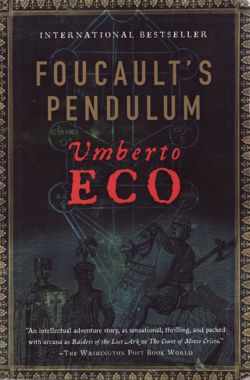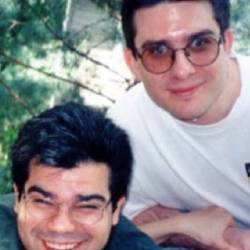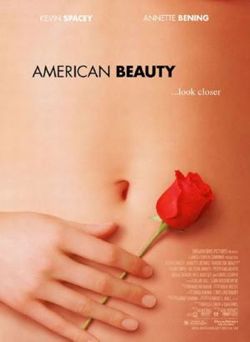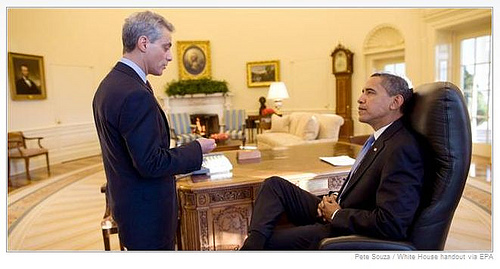So, keeping with what I started when I finished the previous book, I just looked up my “Kindle Ratio”… namely the percentage of the last 20 books I’ve read available on Kindle. I’ve said that as soon as this ratio reaches 50%, I want a Kindle. Well, it stays steady at 35%… 7 of the last 20 books. So we’re still not quite there unfortunately.
|
(As translated from the Italian to English by William Weaver that is.) This is the kind of book that has a reputation as being the kind a lot of people start, but most don’t finish, because it is difficult and inscrutable. So of course I wanted to try it out. Reading the first chapter, I firmly believe that it is intentionally constructed in such a way as to put off readers, and encourage all but the most dedicated to stop there. Not that there is anything particularly DIFFICULT about the reading, it is just a guy having very scattered seemingly random thoughts while wandering through a museum… with all sorts of references to all sorts of things that a reader may or may not get. It is rather annoying. But the book does settle down a bit after that and starts to read (mostly) like a regular narrative, although it does use that very annoying method of regularly moving backward and forward in time, with the vast majority of the book being flashbacks from the guy in the museum remembering what has happened that led him to the museum at that time. Annoying. I hate that device when it is used in TV and Movies, and I don’t really like it any more in writing. Over the course of the novel, the main characters delve into the creation of a huge conspiracy theory involving many of the usual suspects in conspiracy theories. They are making it all up, but as often happens in such things, it takes on a life of its own and trouble ensues. Some of the conspiracy and historical stuff is actually quite interesting. I found myself on more than a few occasions taking a detour to Wikipedia to look up people, places and organizations that were mentioned to investigate a bit about the real world versions as opposed to what was being depicted. And that was fun. But a big part of this was a very transparent look at words versus reality, and questions relating to objective reality versus perceived reality, and if saying something and believing it enough makes it true… or close enough to true that it doesn’t matter…. if there is even a such thing as “true” outside of the perceptions of those looking at and talking about things. Blah, blah, blah, blah. Look, I like those sorts of philosophical conundrums. But it was a bit of a stretch to make it 623 pages long. The value in this book is in the thinking about the concepts being raised and in the interesting historical bits. In those ways it is interesting. There is fun stuff there for those who are intellectually curious about various aspects of European history, or of philosophical questions about the interrelationships between knowledge, language, perception and reality. Or, to be specific, semiotics, which Eco is a professor of. If you like exploring those kinds of concepts, you will like this. But as a flat out novel with an interesting story for the purpose of entertainment… not as much. So I guess it depends what you are into. I did like it for the intellectual stuff, but it would have been nice if the story part was a bit more compelling. Am I glad I finally got around to reading it? Yes. I’d wanted to read this for awhile, and now was the time I guess. Many years ago I read The Name of the Rose, also by Eco, and I must say I liked it better. It has many of the same types of themes and intellectual side trips, but I think the Medieval setting just worked better and the actual story was better… So if you want to read an Umberto Eco book, I’d go with The Name of the Rose first. Um… I really don’t know what to think of this. (via The Daily Dish) For the record, I picked “Peel Her a Potato”, “Rub Her Face With a Mop” and then “Slap Her with a Fish”. The podcast was recorded around 3 UTC on Monday, but I’ve had things going on during almost all of the time I wasn’t at work or asleep since then, so I haven’t gotten the podcast out the door yet. And it isn’t going to get done before I leave to drop Amy off at school and then go to work in a few minutes. Sometimes if it is all edited and processing has started when I leave for work, and all that remains is hitting the “publish” button once it is done spitting out the mp3 file, then I’ll hit that button and do the blog post announcing it during my lunch break. But alas, it is not even edited yet, so it will have to wait. I promise I’ll have it out the door within the next 24 hours or so though.
I wasn’t expecting much. Dunno why. The first 30 minutes or so did drag a bit. It was slow, and not super compelling. But then again, it was supposed to be laying the groundwork about how much the main character’s life sucked. Then it got a bit creepy when he started lusting after the cheerleader. But then it hit its groove. It seemingly cycled between hilariously funny, creepy, and just sad. In the end end it was a compelling combination. I liked it a lot. I guess I understand the five Oscars. :-) And, despite the impression I had before hand, it was most definitely NOT primarily about the guy and him lusting after the teenager. This was a portion of it to be sure, and an important element, but it was just one element in a larger picture. It was more a mid-life-crisis movie than creepy old man in love with teenager movie, although of course that is one of the ways the mid-life-crisis manifested itself. Anyway. Good movie. I liked it. Worth a rental if you didn’t see it back in 1999 when it was in the theaters. What I believe to be my last Christmas present (that of course was supposed to arrive on December 24th or earlier) just arrived! This means I can now start doing the whole Thank You note thing! By email of course. :-)
(White House via DemConWatch) This whole little speech has a lot of interesting stuff in it. Click through for the whole thing. But I quote the part I find most interesting: President Obama’s Address to WH Staff on Ethics, Pay Freeze, and more
In addition in his first day, Obama also put a hold on new regulations the Bush administration was putting through at the last minute, suspended proceedings at Gitmo, and more. We’re getting off to a quick and strong start. And while in many elections it seems that there really is not much difference before and after, this time the contrasts are immediate and striking. |
||

 Sam and Ivan talk about:
Sam and Ivan talk about:

